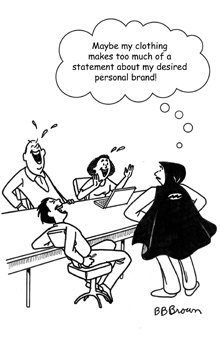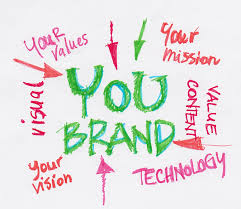
Although, recently there has been a lot of hype around personal branding, the term itself has been around for over fifteen years. However, it really didn’t stick until social media hit the masses and created the potential for those “thought provoking” posts from college to haunt you in the professional world.
So, what exactly is your personal brand? Well, as the name suggests, a personal brand is how others perceive you. And since perception becomes reality, personal branding should be your number one priority when setting out on your job search (among other things). Remember, your brand is created through your actions. What you do or don’t do, makes up your personal brand. Do you know your digital footprint? If you haven’t already, try Googling yourself. Just because your Twitter account is “clean” doesn’t mean that you weren’t mentioned by a friend whose profile picture is a genetically modified “poison ivy” leaf.

Of course your brand will be affected by others and how they perceive you, but then again how they perceive you is based off of what they have seen of you, heard about you, or by the people or groups you are associated with. Therefore as Dan Schawbel put it, in order to discover your brand you need to make both sides of the following equation equal:
Your self-impression = How other people perceive you
Personal Branding has been around for a substantial amount of time now, so why is it that job seekers should start paying more attention to it? Well the simple and short answer is technology, but more specifically it's social media and the emergence of the digital footprint. What do I mean when I say the digital footprint? Your digital footprint is everything on the web that either you created, posted, or shared as well as what other users said about you, retweeted or tags. In essence, we are already building our personal brands and leaving a digital footprint through our numerous social networks, which has created some problems for people because they were not aware that your current or potential employer may legally look at your Facebook, Twitter, Linkedin, or any other social network account without consent or knowledge.
Your personal brand should define not what you are, but who you are by highlighting your passion, abilities and uniqueness. But don’t just arbitrarily decide what these qualities are, you need to do some research. First, write down what your strengths are and who you think you are. Then ask a friend, professor, colleague or manager (current or former) to do the same. Warning, this can be a humbling exercise, but it will provide you with who you really are. Compare yours with others to not only define the common threads, but to look for glaring differences. For example, if you indicated that one of your strengths was your writing ability, but your colleague said it was a weakness of yours then you need to understand why? This is important to note because it may be based upon your text messages (“Yo, u c B’s gm?”) or Tweets versus what anything you produced at work. Yes, the game has changed and the lines no longer exist between the professional and personal you.

Now that you have compared yourself to what others think about you, it’s your opportunity to correct any perceptions that you don’t agree with. This is the exciting part because social media allows you to design yourself simply by blogging, posting, tweeting, etc on topics that will showcase your desired traits. Start by setting up a personal website or blog and makes sure your messaging is consistent with other web identities such as Twitter, Linkedin, and Facebook. This is a good way to start molding your personal brand. But it’s important to remain authentic. It’s easy to sniff out someone who is trying too hard or all of the sudden is following the most influential sales people, writing tips on the sales process, and joining the most popular sales groups a week before you interview for your first sales job. So no, you aren’t the first to think of that. It won’t happen in a day, your personal brand takes time and effort in order to establish a consistent digital footprint. Think of your digital footprint as your real-time resume.
The web advertises your personal brand whether you want it to or not. Some companies are even performing a social screen by scouring the web for any information they can find about a candidate before they shortlist for an interview. They may also assign more weight to different social networks but it is still important to realize that privacy online doesn’t exist within the current framework of free social networks. However it isn’t doom and gloom Orwellian speak, you can use this to your advantage too! Many people have leapfrogged the corporate ladder by developing a personal brand that displays their attitude, knowledge, and passion about various topics and or industries.
Nowadays your personal brand may be all that can separate you from any other candidate. So it's wise to assess and maintain it, this is your selling tool, your way to say here's why I'm the best person for the job. In the end you are who you are, and the elimination of privacy online will allow recruiters and companies to see that from the initial stages of the recruiting process. So take control of your digital footprint and shape your brand or someone else will.